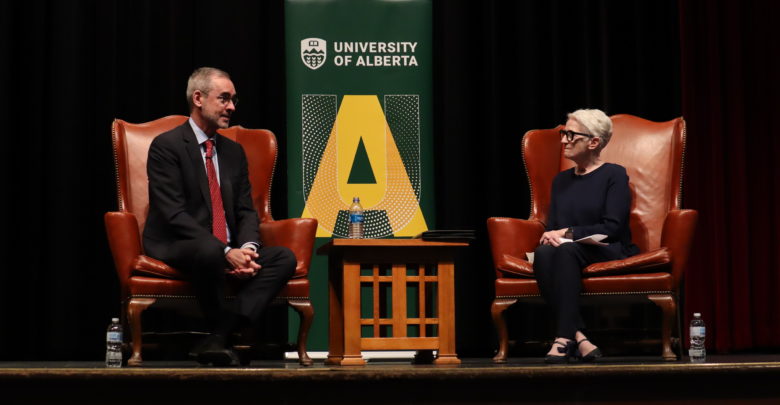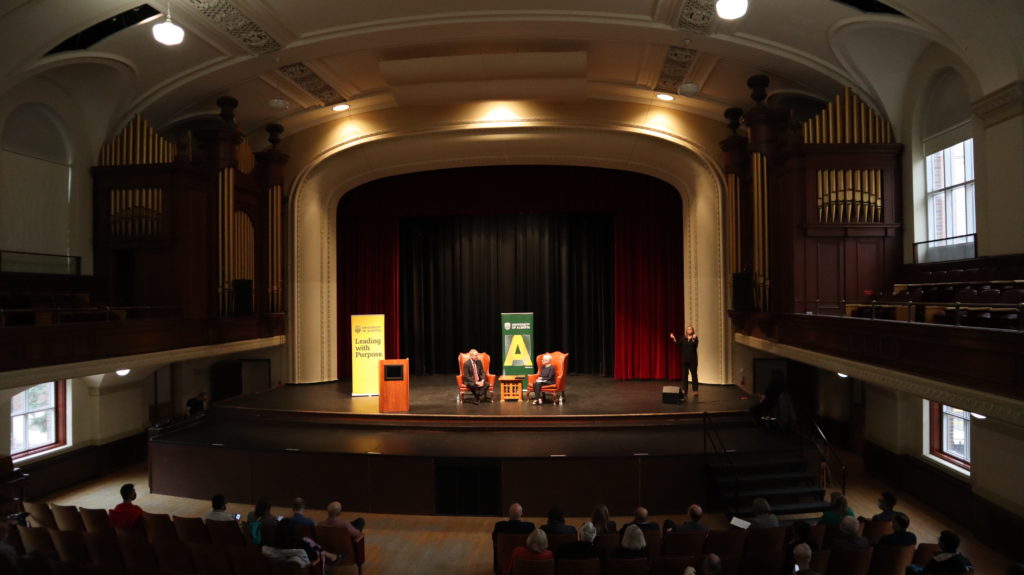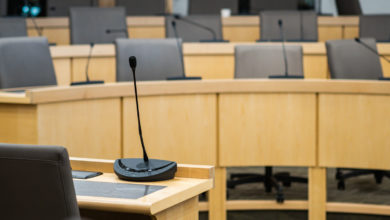President Flanagan highlights growth, shares plans for future in state of university address
In the state of the university address, the university's goals for the future and reflections on the past two years were shared.
 Emily Williams
Emily WilliamsOn May 3, during the state of the university address, Bill Flanagan, University of Alberta president and vice-chancellor, reflected on the recent past of the university and the plans for the future.
The address began with a land acknowledgement and a summary of the past two years highlighting the university’s journey through the COVID-19 pandemic followed.
“Every single individual in our community showed exceptional dedication and commitment to one another through a long and challenging time,” Flanagan said.
Flanagan reflected on academic restructuring and the struggles over the past two years that arose because of it, such as job loss.
“As we’ve restructured, I am proud of the fact that 84 per cent of all new positions at the university have been filled by U of A employees,” Flanagan said.
“Our future lies in the remarkable opportunities ahead from the University of Alberta.“
In the address, Alberta’s young population was raised as an advantage for Alberta. This has caused an increase in admissions applications by 25 per cent in the past six years. In addition, the Government of Alberta announced $171 million in support of post-secondary enrolment as part of Budget 2022. As part of this three-year investment from the provincial government, the University of Alberta expects nearly 2,400 additional enrolments and over 135 new faculty and support staff in high-demand areas over this three-year period.
Deconsolidation highlighted as a goal for the future
A main point of the address focused on the advocacy done for the deconsolidation of financial statements from the accounts of the province.
For accounting purposes, the Government of Alberta controls the university under the Canadian Public Sector accounting standards. This means that money spent by the U of A is considered to be money spent by the Government of Alberta. Because the government has committed to reducing expenditures to balance the provincial budget, consolidation with the U of A requires the university to reduce expenditures to prevent the perceived increase in government spending.
Last year, the minister of advanced education announced that the U of A would be deconsolidated from the provincial accounts. This deconsolidation is planned for the next fiscal year. Once the university is deconsolidated, the university can begin to spend some of its “carry-forward funds” — which consist of the university’s own revenue from tuition and donations. The university currently has $160 million in carry-forward funds it can spend once deconsolidation is complete.
Flanagan concluded the address with a promise that the university will continue to grow, closing with the university’s brand promise to “lead with purpose.”
“Moving forward, we make this simple but vital promise. We, the University of Alberta will never be satisfied with the now. We will always be seeking, always be challenging and most of all, always leading with purpose.”

Question period brings up community and faculty concerns
After the address, audience members were given an opportunity to ask President Flanagan a question.
Jillian Pratt, the president of the Non-Academic Staff Association (NASA), asked a question regarding the university’s plan for growth, highlighting the concerns of support staff.
“What do you have to say to the [over] 5,000 support staff?” Pratt asked. “Based on our survey data, [they] are actually experiencing very much increased workloads, increased stress, low morale, mistrust in the restructuring process and actually decreased — not increased, service levels.”
Flanagan responded by emphasizing the importance of support staff.
“I just want to acknowledge that again, how grateful I am to the support staff in what they’ve done,” he said. “Our growth ambitions cannot succeed unless we have the support staff that we need to achieve our ambitions both for our students and our researchers.”
Julie Rak, a faculty of arts professor, asked Flanagan about non-binary washrooms on campus and lack of space to accommodate higher enrolment, as she noted the university has plans to remove the Humanities Centre.
“If you want to have 50,000 more students on campus, where are you going to put them when you get rid of the Humanities Centre?”
To address this issue, Flanagan noted that the building has suffered from deferred maintenance, which has been an ongoing issue for the university in recent years.
“One thing that we have not done [as a] university is invest in a sustainable way in addressing our deferred maintenance challenges,” he said. “This is part of the restructuring and we will be doing [maintenance] going forward and the new budget model will address this and this is top of mind for me.”
Philomina Okeke-Ihejirika, an arts professor, said that in a recent staff survey, all Black faculty were categorized in the same ethnic category. Noting that this did not reflect the diverse backgrounds of Black people, Okeke-Ihejirika asked Flanagan about the university’s plans to increase inclusion for their Black community members.
“In your vision, where does research and development come into your plan … for African and Caribbean students that are part of your community?”
Flanagan responded with the importance of international students and the plans to increase African international student enrolment.
“There is huge opportunity for us to increase the numbers of international students coming from Africa to come to the University of Alberta,” he said.
In addition to increasing the number of Black students at the university, Flanagan highlighted specific plans to hire more Black staff across all faculties.
“I believe we’ve announced that there’s a cohort of 10 Black scholars that we’re going to be … hiring in the next year or two. This is a dedicated cohort hiring that is intended to advance our commitment to diversity and inclusion.”
Jessica Vandenberghe, a Dene Tha’ Indigenous woman, Sixties Scoop survivor, child of two residential school survivors, as well as assistant dean of engineering and culture, asked if there are plans for a governance review to address colonialism and systematic behaviours.
Flanagan emphasized the commitment to equity, and the Equity, Diversity, and Inclusion (EDI) strategic plan.
“I would say you’re right, we’re not where we need to be as an institution in meeting our commitment to equity,” he said. “As you know, we have an EDI strategic plan as well, [a plan] that outlines our commitments very much as a university and sets targets for us to move forward. [We will be] holding to those [plans] and making sure that those plans are visible and meaningful and living.”




